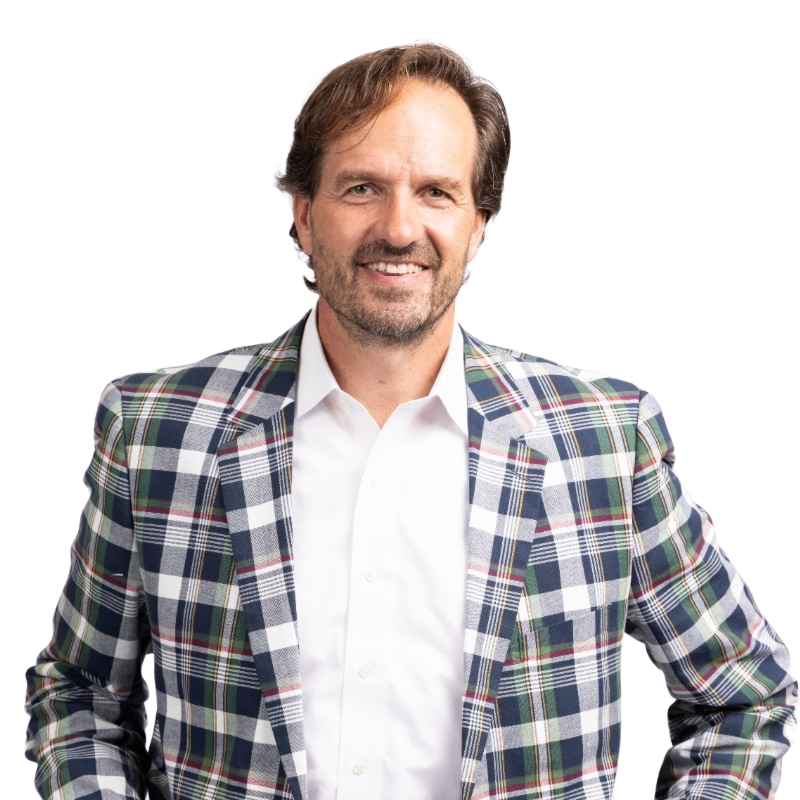

Tracy Young speaks with Shirin Oshidari, an experienced sales leader with a background in companies like OpenSpace, Streetlight Data, and Autodesk. Shirin shares her unique life journey, starting with her upbringing in Tehran, Iran, during the revolution, which led her to move to the U.S. as a teenager. She talks about growing up mostly alone, as her siblings were abroad and she was much younger than them, which cultivated her independence and resilience.
Shirin attributes her character and approach to life significantly to her father, describing him as a no-nonsense, positive person. She discusses how the challenges of losing everything at a young age and being refugees shaped her outlook on life, teaching her to make the best out of difficult situations and to focus on education and moving forward.
Podcast Transcript
Tracy Young: Hello and welcome to path to growth conversations with leaders on go to market. I'm your host, Tracy Young, co founder and CEO of TigerEye. Today, we are joined by Shirin Oshidari, an experienced sales leader who has led revenue at OpenSpace, Streetlight Data and Autodesk. Shirin, welcome. I'm so happy to have you here.
Shirin Oshidari: Hi, Tracy. Happy to be here. Thank you for inviting me.
Tracy Young: So tell me a bit about growing up. Tell me about your mom and dad and what you learned from them.
Shirin Oshidari: Oh my God. Yes. So I grew up in Tehran, Iran, and basically I was around 14, like beginning of 10th grade, and the revolution started. And so basically my parents, um, sent me abroad to U. S. I'm the youngest of four, um, but I'm kind of like an oops baby, um, um, the last one but the other three were one year apart and I am seven years younger than the last one.
So I pretty much grew up by myself, even though I have brothers and sisters, they were all abroad when I remember growing up. So I pretty much grew up by myself. Um, and I think a lot of what, who I am is really because of that, uh, my independent and just doing stuff on my own because there was nobody around.
And my parents, I think they're kind of like when the third one left, they thought they're empty nested, even though they still had another kid. But because I'm so, we're so much younger, they're kind of like, Hey, she's fine, you know? So they also weren't that much around.
Tracy Young: So you were, you were just independent just to survive as a young child.
And that's really made you who you are today. So none of us would be where we are today without someone helping us out along the way. Tell me about one person who helped you become the person you are today.
Shirin Oshidari: I think it's really my dad. I am very much like him. Just, you know, they always say nature versus nurture.
I think it's both. I think nature wise, I'm pretty much like my dad. My dad was no nonsense. Um, very positive. So nature wise, I'm like him, but then the nurture was really becoming independent and figuring my own way from early age. And yeah, we lost everything at age 15. And my dad is like, It is what it is, you make lemonade out of lemon, you just get educated and do the best you can and don't sweat the past and just march forward and look at the future.
So it was just, you know, that was his nature that brought me the independence and then just, you know, moving forward and, and, uh, doing the best I can with what I have.
Tracy Young: That's really incredible. I mean, I can only imagine how there must have been some fear there, right? They're basically refugees. All of you guys were refugees.
Um, revolution happened. There is chaos in your home country. And then you guys just up, pack up and leave.
Shirin Oshidari: It's so funny. It's when it hit me was. My kid was playing a sport and this woman sat next to me and she was a psychiatrist. And she just asked me, Hey, who you are? And just at the game and tell me about you.
And then I started crying. This is like 20 years later, like I was, you know. I don't know. I was like 45, 30 years later that occurred to me. Oh my God. I've gone through so much at the moment. It's just like going, going, going. You're not looking. Oh, like you don't have time to cry about your situation. It just, and I never did.
This is what I'm saying. The first time that it hit me when that woman, which I didn't know, just asked me and I'm like, yeah, did my, I had a tough background. Like I'm just realizing that it is.
Tracy Young: Well, I'm really glad you got some impromptu free therapy at the soccer game. Um, and I think so much of like company building and sales is that way too.
I mean, at a much lesser degree, of course, you just have to keep going. Like you get nose in your face all day. You get people, customers not happy with their product, they're churning. And yet you still have to hit your numbers for the company so that the company can make payroll for all the families involved.
So tell me about your journey into enterprise sales. We've had a great conversation about this. Let's, let's start from like how Shereen, who is like very educated, who actually was a technical, a technical field
Shirin Oshidari: went into sales. Yeah. And it was total fluke. So I finished computer science. And I'm looking for a programming job.
Then at some, I don't know, outing, I met a family friend who was starting a company called Kellar Corporation. And he said, he's going to resell Primavera software and AutoCAD. And this is in eighties. And I'm like, Oh yeah, I don't know anything about these. I'm like a kid, 20 year old looking for a programming job, but I need money.
And he's like, Oh yeah, how about this? You help me out until you find a job. Uh, you know, and he was like, pay me a thousand bucks a month, like really nothing. And I'm like, cool, I'll help you. But while I'm looking for a job, because I really want to do programming. So my first job was cold calling. And he's like.
Okay. Here, here's the list of companies you cold call and we go in and we sell Primavera. I'm like, cool. I loved it. Who knew? I loved cold calling. I love talking to random people and just shooting the breeze. And I was just myself and you know, I didn't have anything to lose because again, I was looking for a programming job.
I was just, this was like my, so that was my introduction to sales. I loved it and the funny thing is this guy was terrible at sex. So we would go, so I would set up meetings, we would go there to do a demo. He would talk, talk, talk. Like I would take aspirin before we go because I knew I'm going to get a headache.
So, so basically I learned what not to do. This, he was my best coach, not teaching me what to do. I did everything that I didn't do everything that he did. So I tried to be opposite this guy because he was so technical and so brilliant, but he just talked to him and I'm like, this is not training. We're trying to sell.
Talk about value where they should buy. He was going into every day. Our demos were four hours. I'm like, Oh yeah, I'm not going to do that. There's demo should be like first what they want. Anyway. So I learned a lot and just, yeah. So then I ended up staying there 10 years. I mean, the, the short gig looking for programming ended up being 10 years and I never ended up doing programming.
Tracy Young: And then from there, your trajectory kept going. You ended up leading sales team at Buzzsaw, at Autodesk, at Streetlight Data, and then most recently OpenSpace. So you've actually spent a lot of time in construction.
Shirin Oshidari: Yeah, it just, like I said, it was just luck because it was Primavera was the first product that I sold and it was mainly for construction.
I mean, we did sell to aerospace and other fields, but it was mainly construction and I love construction people. Up to me, my personality aligns with theirs. Um, no nonsense. Hey, does this work for you or not? And construction people are exactly like that. They have a big project. They have a budget. They don't, you know, string you along.
Either this works for them or it doesn't and they tell you and So I love, I love the customers and also I love real estate in general. My sister's an architect. My husband used to do a lot of fixer uppers. After he retired. I just love real estate. I like building stuff, seeing stuff coming from nowhere. I love just real estate construction, all of it.
Yeah, yeah, yeah. Me
Tracy Young: too, obviously. So, as a sales leader, what just takes up too much of your time? Like, it's work you have to do, but, you know, you wish you could do less
Shirin Oshidari: of. Yeah, as a sales leader, you have your team, right? Your sales team that you're hiring and coaching and mentoring and growing. So, that's one group that you have to nurture.
Then you have customers, right? So you gotta make sure that you understand the customers need and what are they looking at and what keeps them up at night and how we can help them because customers are key to our success. And then you have the rest of the company, like product team, the marketing team, the engineering, the operations.
So then. You have to then come and help them, make, make sure, hey, we're producing the product these customers are looking for. Make sure we're marketing to the right audience and saying the right things. So I feel like sales leader is really in the middle of all of this. Yeah. Yeah. Which is pretty daunting when you think about it.
I
Tracy Young: totally agree that. A good performing team is when cross department leaders are just, you know, having good conversations together about the business and actually working nicely together and able to have the hard conversations. So as you know, culture is everything. What behaviors do you want to encourage and minimize when you think about like, I'm going to ask you to describe your own team working well with others, not just their own, you know, their own immediate team, but folks in marketing and folks in customer success and folks in the product and engineering side.
Shirin Oshidari: Yeah, I always say, I mean, first I, first, when you come into organization, you want to first look at the sales team. And I always look at sales team as a sports team. I don't like individual. I mean, I, we are a team. Yeah. And. And when you get into new companies, a lot of times you have one or two individuals that doing the main, uh, selling.
And, and I like to have teams that they work with each other, they share best practices, they support each other. Many times you come in and you have A lot of bickering and people not getting along with the sales team. There's channel conflict, there are fights over this deal and that deal. So that's, first I want to make sure I have a good culture within the team.
Yeah. In the sales team. And I was fortunate, I always managed not only the AEs, but the BDRs, SDRs, the customer success, the solution engineers, pre sales. The sales ops, you got it. These people have to work together and pass leads to each other and and support each other. So that's number one. Then you want to build relationship with the other execs because we can't sell a product.
That doesn't function for the customer. So we got to keep giving feedback to the product team and what's working for customers. What's not, what is the next product we need to product is extremely important. So you gotta make sure you have a healthy relationship. Um, they also understand why you saying like.
I always say it's nothing personal. I'm not saying this for me. I'm telling you because this is what I heard from 50 customers. And this is for the health of our company. And then marketing. We can't live without pipeline, right? It's we have to have pipeline and leads and brand awareness. These are the things that marketing needs to help us.
And operation. So it takes the whole village. Whenever we lose, we make our quota. I thank the whole company. I'm like, Hey, we couldn't do it without support, operation, product. And when we lose a quarter or don't make our quarter, I also don't blame sales under. So it's always a whole village. The whole company, we live together.
We lose together. Unfortunately. Some leadership, they think that sales is, Oh, you guys miss Koda is all on you. I'm like, no, we need product. We need marketing with the whole company. Yeah. I am like, I didn't do it all on myself. Thank you operations. Thank you. Product. Thank you. Marketing. We did it to get.
Tracy Young: Yeah, I love that humility, and I think that's a great way to build trust and relationship that, you know, it's like we celebrate wins together because I didn't do this alone, but if there is, you know, if we're not hitting our numbers, it's not your fault. I will. I will take this one for the team. It's a really good.
I think just leadership. So thanks for sharing that. Um, I feel that with every new person coming in, um, culture shifts a little bit. Um, and it's dynamic. How do you maintain good culture as a company grows? Cause it gets, it really does get harder as a company grows. There's like, it's like you hit Dunbar's number at 150 people.
And you guys, you've been at teams that are well surpassed that, but it's just like. Just naturally, there's tensions that happen and there's infighting, hopefully not too much of that. How do you, yeah. As a leader in the company, how do you encourage the team to like work nicely
Shirin Oshidari: together? Yeah, I mean, that's really the hardest job.
I think culture is number one, and it really starts at CEO. Mm-Hmm, . I am, again, my nature, my upbringing, whatever you call it. I've always been very straight shooter and. and direct. And that's the one thing I always look for is direct matureness, but all, but obviously with respect. I don't like passive aggressive, uh, cultures that people are nice to your face.
But then behind the scene, they're saying things,
Tracy Young: um, Oh, yes. What do you do with that? I mean, I've certainly worked with people in my own company that I didn't fire fast enough where they're, you know, they're just so saying the right things. And at my level at CEO, like everyone's saying nice things to me.
Except every company knows this person is not that nice. So what do you do when you find someone that's like passive aggressive that reports
Shirin Oshidari: to you? Yeah, unfortunately, that's, that's the struggle that and I see them everywhere. And I try to, um, so my, my thing is like, look, we all are here to win and we all team.
So you telling me to my face, if I'm doing something not right, that will make me on this because everyone has blind spots. I'm sure I have blind spots. But you not telling it to my face and going behind the scene and saying these other 50 people, you're not doing yourself or a company a favor. If you have an issue with me, the best person you can talk to is me.
So you explain and tell me why it's not working and what I should do better. That's how mature grown up people work, and that's how you win together. Like, by you going around and bad mouthing me, like, what are you accomplishing? Yeah, yeah. So I try to just keep explaining. I mean, we all have issues with each other.
But just be direct and tell people, because they might be, have a blind spot and they don't know. You're helping them and you're helping yourself. And just be upfront, like, life is too short to Like do all this bullshit stuff, like, what are you trying to do? Like, who are you helping? You're not helping yourself.
You're not helping the other person. You're not helping the company. So I don't really don't understand people who do that. What are they trying to gain? Yeah, yeah, yeah.
Tracy Young: I, I really like, um, well, first of all, I think most people don't have your personality and your courage. Just be like, yo, what's up? Let's talk about it.
And, um, and then I really like that in these situations, it's not personal, right? And you're not saying like, why are you doing this? Why are you going behind my back, talking all kinds of smack. It's like, Hey, the company needs us to win. So like, let's figure it out together.
Shirin Oshidari: Exactly. Exactly. Let's all be grown up and mature.
And I mean, I've let, let people go and I'm still best friends with them because I'm like, Hey, the, just your skill set at this time doesn't work. So it's, none of it is personal. We're here to do a job and make our company successful. So just be honest with yourself and your colleagues. Okay. So we talked
Tracy Young: about relationships with people who report to you and people who are adjacent to your counterparts in other departments.
What about a healthy relationship between the head of sales and the CEO? I mean, it's such an important relationship. Can you talk me through how you think of that?
Shirin Oshidari: Yes. So that's what I just talked about is trust. And honesty and having each other back. Uh, that's, that's the something that I look for.
Right. And I've been fortunate in my past that I've had CEOs that maybe we didn't get along, but then we were honest and we, you know, we decided we agreed to disagree or, um, yeah, it just, and that's fine. You just move on. But, but. This backstabbing, throwing each other under the bus, this thing, again, it doesn't help anyone.
Just be honest. with your CEO or CRO, uh, trust each other and then have each other's back. And, yeah, there's one quarters that go down, another quarters go up. As long as everybody's doing the best they can, that's all you can ask for, huh? I mean, you can make miracles. Sometimes people think that CROs have to do, like, God given miracles.
I mean, no, we all, I mean, we We're all people and doing the best we can sometimes economy or there are other issues that You got to roll with the punch, but it is what it is, and it will, again, trust, honesty, and having each other back. I think those are the three things I look forward to see. I
Tracy Young: really, I really think the having each other's back is an important note here.
I definitely have had worked with executives who, you know, luckily this is like a minority of them, but it's like. We've agreed on something and then we walk out to the team and then we're asking the team of different things, which makes the executive team look so weak and,
Shirin Oshidari: um, exactly, or just not being honest with the CEO.
I mean, if you're not gonna make the number, just say that. Yeah, I don't wait till last second, but some CEOs though, it goes both ways on some CP CEOs want to hear the good news all the time. They don't want to hear the bad. But
Tracy Young: yeah, it's, it's hard. It's my mantra is go where it hurts. Yeah, not easy to do.
I mean, you might not like what you see if you look close. Then you actually have to do work even harder to fix it. So how do you think about your responsibility to teams outside of your org, meaning the ICs and managers and other groups like engineering and customer success and marketing there, there's like barriers, natural barriers between these groups.
Right? So sometimes there's misaligned incentives or low trust. Um, I guess my question is, how do you build trust with The other groups, product and engineering, marketing.
Shirin Oshidari: Yeah, I mean, that is really hard because everyone has their own agenda. But again, to me, that comes from the CEO. Making sure that we all have the same goal.
Is our goal ARR? Or is our goal efficiency? Whatever is our goal. I think it starts with the CEO. And make sure that everyone is aligned. If, if it was me, I would put everyone on commission in the, on the company, like everybody. I mean, even if it's 10 percent incentive, you know, so that they understand that again, if the goal is to hit, I don't know, this revenue target, make, let's have that incentive with the marketing people too.
So when we keep saying, Hey, we need leads, we need pipeline, we need brand awareness. Because we're trying to get to our ARR, which is the goal of our company. So just keep reminding them we are trying to follow our CEO and get the company to our goals. We need to have this marketing events. We need to have this product or else we're not going to make our number.
We're not in vacuum. We need to work together. So just explaining and, and framing and reasoning and. Actually, one of my good, uh, friend and executive at Autodesk, I actually had a hard time with this at Autodesk. And he told me the best advice I ever had. He's like, you do really well with customers. All your customers love you.
I'm like, yeah, do whatever you do with your customers. Do with our legal team, do with our operation. I'm like, what do you mean? He's like. Have you ever taken our legal counsel to lunch? I'm like, no, he's like, why not? You take customers and you build relationship with them. Why haven't you built any relationship with the legal team?
I'm like that, I didn't know you got it. I mean, that really, that kind of a life went on. After that, I treat everybody in the company. Like they are my customers every time I'm like, okay, I need to explain to this person like, as if it's my customer and build relationship and explain and the framing and explanation.
You can't just go demand a product. I need this because of this, then I take a hike relationship and explain, Hey, I'm trying to sell. And this is what. So again, that was one thing that I never forget. Treat everyone like they're your customers, even if they're intern. Yeah,
Tracy Young: there's, there's two tidbits in there that I love.
One is There's something about eating with people that really brings you together. Something, I think it's something primal, like, you know, we're not fighting and killing each other for food like cavemen. It's like, oh, we can actually eat together and like, be okay. You must be my friend. You must be, you know, someone close to me.
And the other one is just, um, Um, yeah, just relationship building and understanding, like helping people understand why you need something
Shirin Oshidari: from them. Exactly. And framing it right. You can't just go say, Hey, do this because I need it. Tell, like, tell, you know, just again, like to customers, you don't go say, I buy this product because I said so.
Yeah. You go explain, Hey, here's the value. Here's why you need this. Here's your pain. It's all positioning, framing, all this stuff that salespeople do with customers. But then when you come internally to the company, you expect people do what you say. Same thing in family actually. When he told me that, I'm like, actually I should do that with my kids and my husband too.
You can't do that. Hey, do this because I said so. You gotta explain why. So that was like really big, uh,
Tracy Young: Learning them for you, um. You, you've been working in sales for a long time, um, never actually took up that programming job. So how has the sales profession changed over the course of your career? I think there's like a lot of stereotypes that aren't good.
For sales, and it's why there's so few, um, leaders who are women today. What has gotten better and what has gotten worse in sales? In your opinion? Yeah,
Shirin Oshidari: it's funny. So what has gone better is the CRM. And all the add on products, data, tools, the text stack. Uh, I remember my first job, we had Act. It was a desktop product that I just typed in.
It was like a roller deck. They just basically, instead of a car, it's now. You can search a name now. It's just unbelievable what you can get. So the CRM and all the tools, fantastic. What hasn't changed is what we just talked about. You still have to build trust and relationship with customers. People buy from people and to all that people side, you still have to do all that and, and show value and, and that, so that hasn't changed.
Um, and do you see anything that's gotten worse? What has gotten worse? Just the
Tracy Young: sales profession. Anything that's gotten worse?
Shirin Oshidari: Yeah, I think, I mean, the thing is people think of salespeople as car salespeople, used car salespeople. That is, you know, has been really, it's like my family. They're all doctors, engineers, architect, and I'm like I'm doing sales.
They're like what? We sent you to college and you did all this? You're doing sales? Like are you kidding me? Like why did we spend all this money? Like because they all think of sales as used cars. Not again, I'm nothing against used car sales people, but I'm just saying, I don't know. It has some kind of a bad rap to it.
But I've walked away from a lot of sales. I've told a lot of customers, even when I was selling Primavera, I'm like, you know, for your job, you should buy a Microsoft project. It's a fantastic product. For your project, you don't need a heavy duty scheduling software like Primavera. So I'm very honest, straight, with customers all day long.
I would tell them if this is not a good fit. Because you don't want to sell to people who this is not a fit. It's a nightmare. They call you next day, they want their money back, they want refund. I'm like, learn that lesson day one. If it's not a fit, You advise them and you walk away. You go to places that you actually have a fit because then they become loyal.
Then they build trust and they refer you. So I think good salespeople are really professionals and they're solving big problems for your organization. And. And that's what I do. That's what, that's why my customers trust me and believe me and want to buy from me because they know I'm not going to push and shove and sell something that doesn't fit because that's not good for them.
It's not good for me either. I get a call back in six months or whatever, and then I'm not out.
Tracy Young: With all our sales folks who have come in, come and gone over the years, it's like you are, you are a business partner to this customer. You're just advising them on what is best to help their pain points. And And you're also, you know, if you're in a region where no one else is, and you're only like for the customers in Alabama, they only know you, you are the CEO for Alabama, because they don't know anyone else in San Francisco, and you are face and voice of our company.
And I think, I don't think people understand that enough. And for people who, uh, Because I meet so many people who are in, especially like service jobs. And it's like, I know how little money you are making. And you're, you seem like you're really hardworking. And I wish I could just tell them, do you know, there's a profession in sales that if you just go and be open to learning and work really hard, that you can probably take care of your family better on that career path.
And it's, um, it's a shame that Especially like from for moms and women, they don't realize this is a career path. So what advice would you have for people new to the profession? Um, young people coming into sales, what early career? Um, salespeople, should they be doing more and less of
Shirin Oshidari: first be true to yourself, right?
I mean, don't like, I mean, life is short. Enjoy what you do. That to me is number one. Um, and then just be a learner. I mean, I'm, I'm reading this book, which I love. It's called mindset. It's all about
positivity and, and having a learning mindset and yes, you're going to get a lot of no's. There are a lot of customers who hang up on you or you lose deals. But so be it. Learn lessons and, and figure out, okay, don't say that next time you did this didn't work. They got hung up on you. Pivot, try different things, talk to your colleagues, say what they're doing that's working, you know, always have a mentor and ask around and learn and don't be discouraged.
It's, it's, it's a hard job, but it's also very exciting job. It's very rewarding when you do close a deal. It's fantastic. Um, so again, enjoy it and don't sweat the little things. And you lose deals, it's okay, as long as you learn not to do it again. And just enjoy and have a good time. Life is short, you know?
It really
Tracy Young: is. And it's true, I think failure is so hard. It was so hard for me as a younger person, I mean, you know, who was like Good at school. And I wasn't, didn't never fail. And then the first time I failed, it was like, felt like the world came crashing down. I can imagine it's the same way for young salespeople who are getting no all the time, but you're right that each deal that you lose, there's, there's something to be learned there that there's like, it's a data point that you can use and then, you know, use to hopefully win the
Shirin Oshidari: next deal.
Exactly. So build thick skin, huh? I mean, to get to stay in sales, you need to not take stuff personally, right? It's just a job and you want to get better at it. Like any job, it takes time. Surround yourself with people who are good at it. Ask good questions. Learn. Even if you lose a deal, call the customer and ask.
What happened? What did I do wrong? Help me understand. Why did you buy this other tool? Did we do something, the product was short or did I say something? Like, again, call them up and ask and, and they like that you're interested to know maybe there was something else you could have done. Most of the time they're like, hey, we didn't buy anything.
It wasn't you. So just we'll call you in six months. So many times actually you, you think you lost the deal. Maybe you actually didn't. And the fact that you followed up, they're like, Hey, this, they're actually interested to understand why, what happened. So yeah, just be positive and, and. And keep learning.
You'll succeed as long as you don't give up and keep learning if you enjoy it. If it's stressing you out and you can't sleep and you're having ulcer. Then that's not the job for you, right? Then go do something less stressful. It certainly is not for everyone. It's a stressful job. It is stressful.
Tracy Young: Um, but it can also be very rewarding.
And it rewards those who keep learning and keep working hard. Um, is this the same advice? Do you have other advice you would give yourself? So not to a young salesperson, but like to yourself 10 years ago.
Shirin Oshidari: Yeah, that's interesting. I don't know. I go back and forth on this. I remember, uh, Carl Bass, uh, CEO of Autodesk, always used to tell me, Hey, why don't you go do, like, do other things?
Like, there's this opening in operations or in other groups, like, It's well rounded. I always wonder if I should have done that. I always add him and I'm like, No! I love sales. I'm all about winning business. I don't know. I, I, I still don't know if I should have done that. Maybe done some marketing, some operations, some other things.
And gotten some flavor of what those jobs about, but again, I was stubborn and I loved what I loved and I'm like, no, I like this, but I don't know.
Tracy Young: Do you have regret? It sounds like there's a little bit of regret there of not trying out, I don't know, operations
Shirin Oshidari: or legal or something. Again, I don't know. I wonder.
I don't know if it's a regret or I wonder where I would have been if I did that. Do you
Tracy Young: think that maybe like when Carl had that conversation with you that you knew you were good at sales, like this is something you have experience in and you know how to do the job and you know how hard it is, but at least you know exactly what you're walking into, that maybe there was some fear of the other departments.
Shirin Oshidari: No, I kind of, I get bored. Ah, okay. Easily. I didn't want to. Other jobs just seem boring. Yeah, I didn't, I can't do a nine to five job. For me, I'm, I love sales because every day I'm talking to different customer or different challenges and different issues, or even just the sales team themselves. It's just like so much going on.
I don't know. I mean, just doing a nine to five, same thing. I will go nuts, but I, I understand why, but I still think it would have been good for me to do it because then maybe I would understand where they're coming from. This is the time that it was very like, Hey product, I need this. Hey, marketing. I need this.
And he's like, Hey, maybe you need to go do some of their jobs and like, understand where they're coming from. So I think I should have done some of that, but for a short get. Yeah. Yeah. Yeah. Maybe the advice
Tracy Young: is like, don't, don't like just try, maybe try to push yourself to try new things. Exactly.
Shirin Oshidari: And, and, but I thought, Oh, I go to marketing, I'm going to be stuck marketing the rest of my life.
I should have been like, just go do it. And so you learn why these people are pushing back. Yeah, like understand where they're coming from. I think that was Carl was trying to do with me, but I was too hard headed and I'm like, no, thank you. I'm good where I am. Okay. Last
Tracy Young: two questions from stretch. Um, you know, things, especially in startups and tech companies, like things don't always go well.
How do you deal with. How do you, like, what do you do when things get tough? How do you deal with the crises?
Shirin Oshidari: Yeah, again, I'm, I'm sorry I keep repeating myself. To me, look, as long as you're alive, you're healthy, go, you know, thank your good fortune or what have you. To me, there's nothing. Like, if I'm healthy and I'm waking up every morning, the rest is just little things, huh?
Don't sweat these things, like life is good, you know, you're healthy. So to me, it's just have perspective, like what's the crisis? If somebody's dying, like what are crisis? To me, if it's not, nobody's dying, just talk it through and understand and try to listen and see. And then, but sometimes, hey, you just have different paths and different opinions and.
Then you're like, great, awesome knowing you, you know, but I'm going to move on and do find some other place that maybe I have more mutual understanding or that better fit. Again, again, the whole thing is don't take anything personal. Yes, it is what it is. Don't sweat it. Learn from it. Make sure you don't do it again and understand what you did wrong that you didn't work out.
There's what they say, what they say, uh, there's that, don't sweat on spilled milk, huh? Don't, don't cry over spilled milk. Don't cry over spilled milk. Spilled, like what are you gonna do? You can't go lick it back. Yeah, you know what's
Tracy Young: funny? You, you and Snoop Dogg could be good friends. He has a song where the lyrics are If you're breathing, you are achieving.
Shirin Oshidari: Exactly. Um,
Tracy Young: okay. Last question. You've worked for so many companies, so many people. Who's the best leader you've worked for? And what parts of them still inspire you today?
Shirin Oshidari: Uh, yeah, I mean, again, I learned from every leader. I mean, I had many, many different leaders. I learned a lot from Jeevan at OpenSpace. I learned a lot from Laura Schultz at Streetlight. She was a PhD in academia. She was brilliant. I learned a lot from her, the courage of starting new company like yourself, um, in like early, uh, 2000 when there are no VC funding for women.
I actually left Autodesk just to help her. I thought, good for you, Laura, you're doing this. So, and I learned a lot from Carl Bass and a lot of our executives at Autodesk. at Primavera. Along the way, I learned different things from different ones. I don't know if it's one thing that stands up. They all have good and bad.
I mean, I'm not saying they all were the best. They all had great assets and traits that I learned. And some I learned, like I said, my first leader, I learned a lot by not doing what it did. That to me, I learned a lot, like not talk for hours at the demo.
It was a
Tracy Young: training on what not to do during a sales day.
Shirin Oshidari: Yes, I think that's what you learn from your leaders, what to do and what not to do. Yeah, Shereen, you're
Tracy Young: awesome. Thank you for a great conversation. I know everyone who's listening was, you know, got to laugh with us. So thank you for an entertaining and incredibly helpful interview.
Shirin Oshidari: Thank you, Tracy. I love talking to you. We could go on forever.
Tracy Young: We can. We should do this. We should do this over wine tasting sometime.
Shirin Oshidari: Yeah, no, but thank you for inviting me. I absolutely follow you wherever you do and love reading all the articles and videos that you publish. Thank you. Okay. Talk to you soon.

.png)













